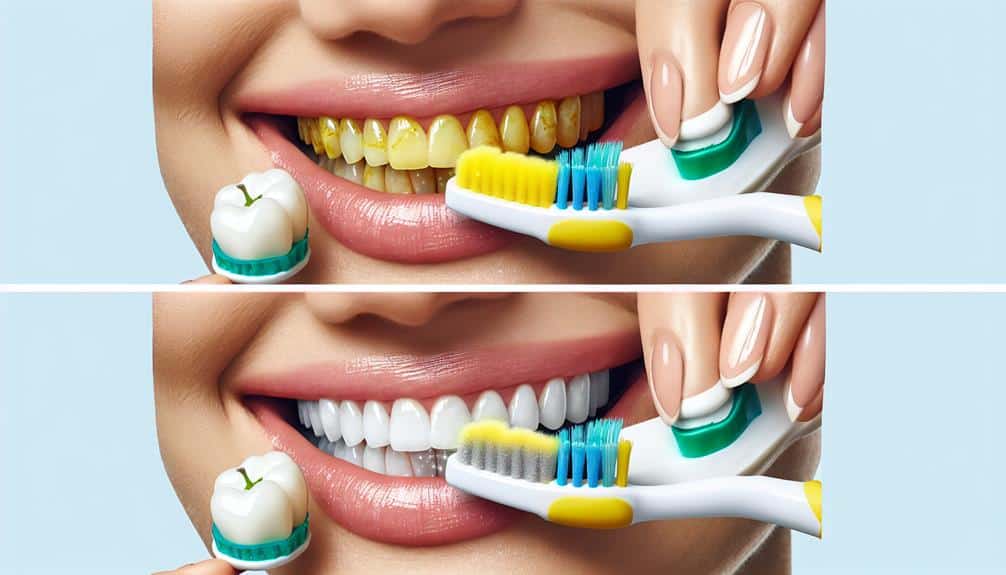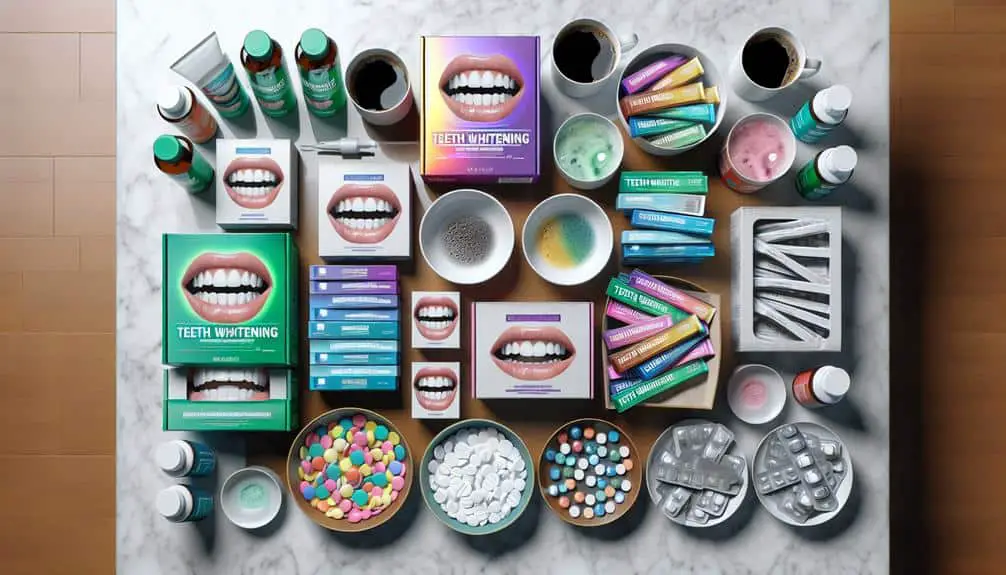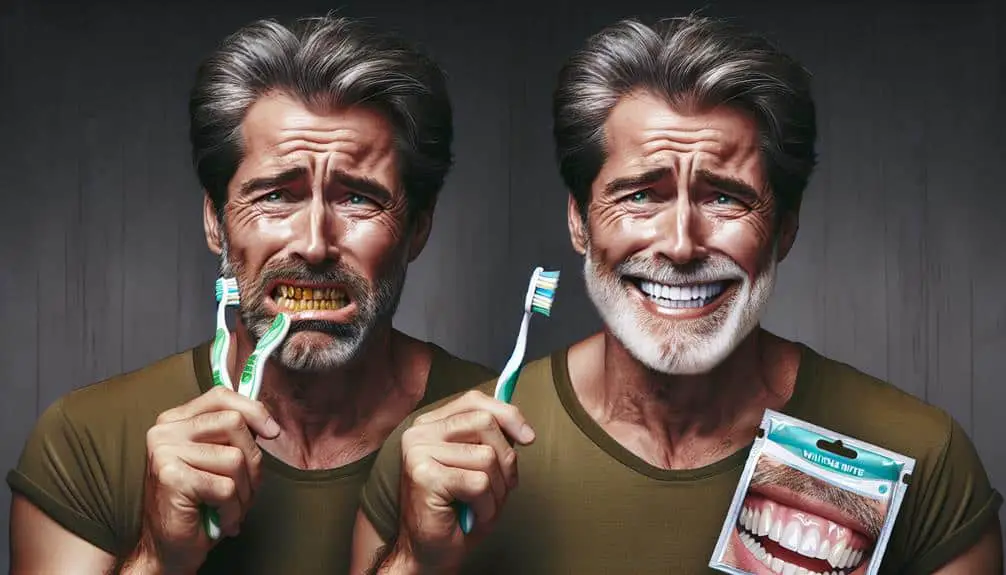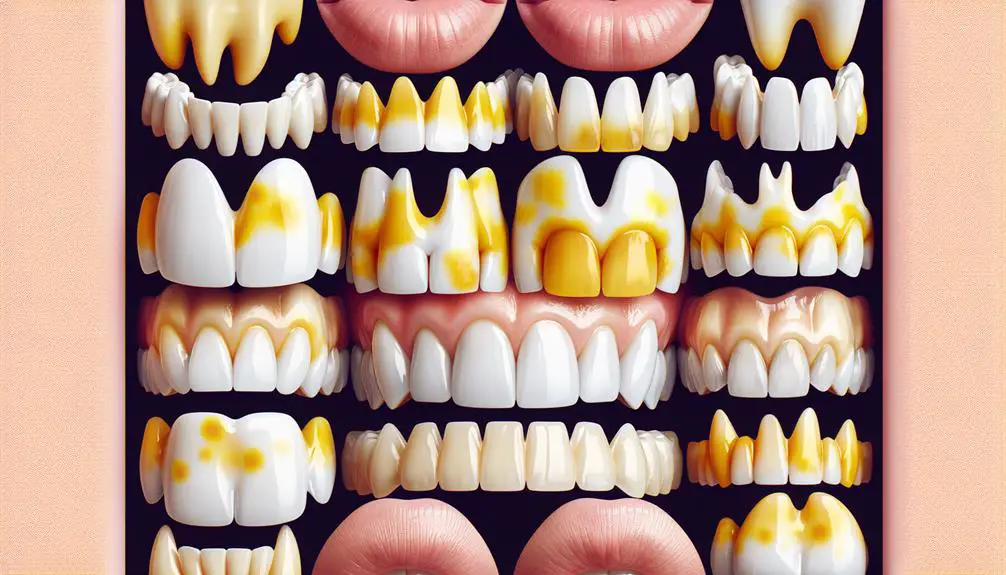To effectively remove medication stains for whiter teeth, try these proven methods. Brush with baking soda in small circular motions to eliminate stains gently. Oil pulling with coconut oil for 15-20 minutes removes harmful bacteria. Use a mix of hydrogen peroxide and water to rinse for 30 seconds, but consult your dentist first. Apply activated charcoal paste sparingly to bind to stains. Lemon juice and salt scrub can reduce stains, but consult a dental professional for severe discoloration. These methods can brighten your smile and improve oral health to a great extent. Enhance your smile with these effective techniques.
Key Points
- Brush with baking soda to eliminate medication stains gently and effectively.
- Try the ancient practice of oil pulling with coconut oil for oral health and bacteria removal.
- Use a hydrogen peroxide rinse in moderation for potent teeth-whitening effects.
- Apply activated charcoal paste sparingly to bind to stains and brighten teeth.
- Create a lemon juice and salt scrub for natural bleaching and stain reduction.
Brushing With Baking Soda
To effectively eliminate medication stains for whiter teeth, consider integrating brushing with baking soda into your oral care routine. Baking soda, also referred to as sodium bicarbonate, provides several advantages for dental hygiene. Its gentle abrasiveness can assist in removing surface stains caused by medications, leaving your teeth looking brighter.
When utilizing baking soda for brushing, it's important to keep in mind the correct technique. Begin by moistening your toothbrush and dipping it into a small amount of baking soda. Brush your teeth softly in circular motions, ensuring to cover all surfaces of your teeth. Concentrate on areas where medication stains are noticeable, but be careful not to exert too much pressure to prevent damaging your enamel.
The alkaline properties of baking soda can also aid in neutralizing acids in the mouth, decreasing the likelihood of tooth decay and gum disease. However, it's vital to use baking soda sparingly to prevent excessive abrasion on your teeth. Integrating brushing with baking soda into your oral care routine a few times a week can contribute to a brighter, healthier smile.
Oil Pulling Technique
Consider incorporating the oil pulling technique into your oral care routine to potentially enhance teeth whitening and overall dental health. Oil pulling is an ancient Ayurvedic practice that involves swishing oil around in your mouth to remove bacteria, toxins, and other impurities. This technique is believed to improve oral health by reducing harmful bacteria that can cause plaque buildup, gum disease, and bad breath. Coconut oil is a popular choice for oil pulling due to its antimicrobial properties, but sesame and sunflower oils are also commonly used.
To try oil pulling, simply take a tablespoon of your chosen oil and swish it around in your mouth for about 15-20 minutes before spitting it out. Make sure not to swallow the oil, as it may contain harmful bacteria pulled from your mouth. After spitting out the oil, rinse your mouth with water and brush your teeth as usual. Incorporating oil pulling into your oral care routine can be an effective natural remedy for improving oral health and promoting whiter teeth.
Hydrogen Peroxide Rinse
For a potent teeth-whitening method, incorporating a hydrogen peroxide rinse into your oral care routine can be highly effective. Hydrogen peroxide is a common ingredient in many whitening products due to its ability to remove stains and lighten the color of your teeth.
To create a hydrogen peroxide rinse, mix equal parts of 3% hydrogen peroxide and water. Swish this solution around in your mouth for about 30 seconds, being careful not to swallow it. Spit out the rinse and rinse your mouth thoroughly with water.
This rinse can be used once a day before brushing your teeth. However, it's crucial to consult with your dentist before adding this step to your oral hygiene routine. While hydrogen peroxide can help whiten your teeth, using it excessively or incorrectly can lead to sensitivity and gum irritation.
Incorporating this rinse into your dental care regimen, along with regular brushing, flossing, and dental check-ups, can contribute to a brighter and healthier smile.
Activated Charcoal Application
After utilizing a hydrogen peroxide rinse for whitening your teeth, the next step involves exploring the application of activated charcoal. Activated charcoal is a potent natural substance known for its adsorption properties, making it effective in removing stains and toxins from the teeth.
To create a charcoal paste for tooth whitening, mix a small amount of activated charcoal powder with water to form a thick consistency. Apply this paste to your toothbrush and gently brush your teeth for about two minutes. The charcoal works by binding to the surface stains on your teeth, lifting them away to reveal a brighter smile.
It's crucial to mention that activated charcoal should be used sparingly to avoid excessive abrasion on the enamel. Incorporating this charcoal paste into your oral care routine once or twice a week can help maintain a whiter smile and combat medication stains effectively.
Lemon Juice and Salt Scrub
To effectively address medication stains and enhance your smile, consider incorporating a lemon juice and salt scrub into your oral care routine. This natural remedy can help reduce stubborn stains and promote a brighter appearance for your teeth. Lemons contain citric acid, which is known for its bleaching properties, while salt acts as a gentle abrasive that aids in eliminating surface stains.
Creating a homemade paste using lemon juice and salt is a simple yet efficient way to combat medication stains. Begin by mixing a small amount of salt with freshly squeezed lemon juice to form a paste-like consistency. Gently apply this mixture to your teeth, making sure to cover all areas with stains. Allow the paste to sit on your teeth for a few minutes before thoroughly rinsing your mouth with water.
It is important to note that while natural remedies like lemon juice and salt scrub can help with mild stains, they may not be as effective for more severe discoloration. For best results, it's recommended to consult with a dental professional for personalized whitening treatments.
Frequently Asked Questions
Can Medication Stains on Teeth Be Completely Removed With These Methods, or Will Some Discoloration Still Remain?
Can medication stains on teeth be fully removed? While some discoloration may persist, with permanent solutions like professional whitening treatments or natural remedies such as baking soda, significant improvement is possible. Consistent care is key.
Are There Any Potential Risks or Side Effects Associated With Using These Methods to Remove Medication Stains From Teeth?
When eliminating medication stains from your teeth, it's crucial to contemplate potential risks and side effects. While home remedies can be efficient, professional treatments may provide a more thorough solution with fewer potential risks and side effects.
How Long Will It Take to See Noticeable Results When Using These Techniques to Whiten Teeth Stained by Medication?
To see noticeable results in whitening teeth stained by medication, you can expect a progress timeline of a few weeks to a couple of months, depending on the severity. Consistent use of proven methods, coupled with lifestyle changes and proper maintenance, will enhance the effectiveness.
Can These Methods Be Used in Combination With Professional Teeth Whitening Treatments for More Effective Results?
When it comes to combining treatments for whiter teeth, you can supercharge your results by pairing professional whitening with proven methods for stain removal. The compatibility of these approaches can enhance the effectiveness of your whitening journey.
Are There Any Specific Types of Medications or Stains That May Be More Difficult to Remove Using These Methods?
When dealing with medication stains on your teeth, consider that certain types of medications or stains might pose greater challenges for removal. Alternative treatments, herbal remedies, dietary changes, and lifestyle modifications can help address stubborn stains effectively.



